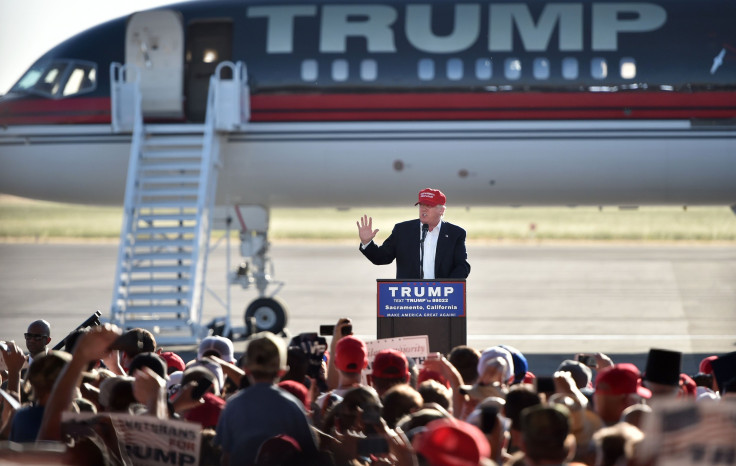Potential #NeverTrump Candidate David French Unlikely To Hurt Donald Trump's GOP Fundraising

The Republican Party's presumptive nominee has a steep climb ahead of him when it comes to fundraising. By his own estimate, Donald Trump needs to raise $1.5 billion if he hopes to defeat Hillary Clinton, the Democratic primary's extremely well-funded front-runner. Collecting a sum of that magnitude generally isn't easy under the best of circumstances, but Trump's efforts are further complicated by the fact that many wealthy conservatives — including billionaire libertarian activists Charles and David Koch — remain ambivalent about him.
Enter David French, Weekly Standard editor Bill Kristol's choice to run against Trump and Clinton as a third-party candidate. French, a conservative journalist and Iraq War veteran, doesn't have Trump's name recognition, or any public recognition to speak of — but he is warmly regarded by many prominent conservatives, including 2012 Republican nominee Mitt Romney. With friends in such high places, he seems well-positioned to undermine Trump's courtship of the GOP megadonor class.
But that doesn't mean a third-party challenge from French — or anyone else with similar politics and connections — would necessarily pose a genuine threat to the Republican nominee's fundraising efforts. Casino mogul Sheldon Adelson, one of the country's top Republican donors, has already pledged his support to the GOP nominee and may soon launch a pro-Trump super PAC. Others, including the Koch brothers, may sit out the presidential race entirely rather than throw their support behind a long-shot third-party candidate.
"I do think Trump may encounter problems raising the $1 billion he needs to compete in the general election," Geoffrey Kabaservice, research director for the Republican Main Street Partnership and author of the 2012 book "Rule and Ruin," told International Business Times. "But my guess is that the Koch brothers and other deep-pocketed entities will be directing most of their cash into congressional races rather than the presidential race. And they'll sit on their hands rather than fund either Trump or a third-party challenger."
There have already been reports that the Koches have resigned themselves to focusing on down-ballot races this year. North Carolina power broker Art Pope, who helped foster a conservative revolution in his state, has said outright that he intends to steer clear of the presidential race this year and instead attend to other contests.
French, a relative unknown with virtually no chance of winning the White House, stands little chance of attracting big conservative money. Yet even without campaign cash or a clear path to victory, he may serve as a symbolic rallying point for movement conservatives who can't stomach Trump.
"I don't think Kristol really believes that he has any chance of political victory if he's putting forward David French as a presidential candidate," said Kabaservice. "But he believes that Donald Trump cannot stand as a representative of the party of Ronald Reagan."
Conservative intellectuals have often held the GOP at arm's length; many figures in the movement also voiced doubts regarding Mitt Romney and the 2008 Republican nominee, Sen. John McCain of Arizona. Institutions like the National Review, French's employer, have historically "policed the boundaries of conservative orthodoxy," said Kabaservice.
He noted that National Review founder William F. Buckley Jr. "basically excommunicated the John Birch Society from the conservative movement, and then did the same thing to Ayn Rand and the Objectivists." But the power of publications like the National Review and the Weekly Standard has ebbed over the decades; the former certainly didn't stop Trump, despite their best efforts.
Kabaservice attributed their waning power to the "disintegration of the centrifugal [sic] forces that held together parties and movements in the past." Ideological coalitions have fragmented, dominant figures of the past like Buckley have been replaced with niche writers, and the conservative movement has largely strayed from the "fusionist" model that once bound it together, he said.
Whether Kristol's public split from Trump will revitalize the conservative intellectual tradition or condemn it to irrelevance may depend on the outcome of the election.
"Let's say Donald Trump loses big time in this election. The conservative movement will have been seen standing up against this interloper who didn't represent what the Republican Party is all about," said Kabaservice.
On the other hand, if Trump does well, it could be seen as confirmation that the modern right "no longer believes in the tenets of this circa 1980 conservatism," he said. In that case, the prevailing view could be that "Trump gave them an opportunity that they missed to update their conservatism so that it better fits the realities of where the United States is now."
© Copyright IBTimes 2024. All rights reserved.






















